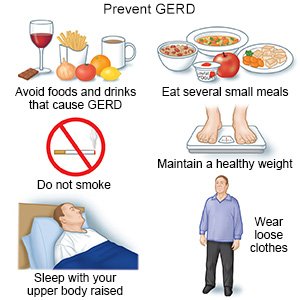Barrett Esophagus
Medically reviewed by Drugs.com. Last updated on Aug 4, 2025.
AMBULATORY CARE:
Barrett esophagus
is a condition that causes cells in your esophagus to change into cells similar to intestine cells. The changed cells may become pre-esophageal cancer cells. This means they are not currently cancer but may become cancer. Dysplasia is a term used to describe the condition of having pre-cancer cells.
 |
Signs and symptoms of Barrett esophagus
are usually related to the signs and symptoms of GERD. You may have any of the following:
- Heartburn (burning pain in your chest)
- Pain after meals that spreads to your neck, jaw, or shoulder
- Pain that gets better when you change positions
- Bitter or acid taste in your mouth
- A dry cough
- Trouble swallowing or pain with swallowing
- Hoarseness or a sore throat
- Burping or hiccups
- Feeling full soon after you start eating
Call your local emergency number (911 in the US) if:
- You have severe chest pain and shortness of breath.
Seek care immediately if:
- Your bowel movements are black, bloody, or tarry.
- Your vomit looks like coffee grounds or has blood in it.
Related medications
Call your doctor or gastroenterologist if:
- Your symptoms do not improve with treatment.
- You have questions or concerns about your condition or care.
Treatment:
The goal of treatment is to control your symptoms and prevent esophageal cancer. Your healthcare provider may also suggest that you make changes in the foods you eat and in your lifestyle. You may need any of the following:
- Anti-reflux medicines help decrease the stomach acid that can irritate your esophagus and stomach. These medicines may include proton pump inhibitors (PPI) and histamine type-2 receptor (H2) blockers. You may also be given medicines to stop vomiting.
- Endoscopic ablation is used to destroy dysplasia cells with heat, cold, or light. Your body may be able to create healthy esophageal cells after this treatment.
- Surgery may be used to wrap the upper part of your stomach around the esophageal sphincter to strengthen it. Surgery may be needed to remove dysplasia cells. For high-grade dysplasia, any affected part of your esophagus may need to be removed. New esophagus tissue is created from part of your stomach or intestine.
Treatment options
The following list of medications are related to or used in the treatment of this condition.
Manage Barrett esophagus:
- Do not eat foods that make your symptoms worse. Examples are chocolate, garlic, onions, spicy or fatty foods, citrus fruits (oranges), and tomato-based foods (spaghetti sauce). Do not have alcohol, caffeine, or carbonated drinks, such as soft drinks. Ask your provider if you should not have other foods or drinks.
- Maintain a healthy weight. Ask your provider what a healthy weight is for you. Your provider can help you create a weight loss plan, if needed.
- Do not smoke. Nicotine and other chemicals in cigarettes and cigars may worsen acid reflux. Ask your provider for information if you currently smoke and need help to quit. E-cigarettes and smokeless tobacco still contain nicotine. Talk to your provider before you use these products.
 |
For support and more information:
- American Cancer Society
250 Williams Street
Atlanta , GA 30303
Phone: 1- 800 - 227-2345
Web Address: http://www.cancer.org
Follow up with your doctor or gastroenterologist as directed:
Endoscopy and biopsy are done regularly to help look for early signs of esophageal cancer. If you have no dysplasia, your providers may do these tests in 1 year. You may then need the tests every 3 to 5 years, depending on your risk for cancer. If you do have dysplasia, you may need the tests several times each year. Timing depends on the dysplasia grade and treatment used. Write down your questions so you remember to ask them during your visits.
© Copyright Merative 2025 Information is for End User's use only and may not be sold, redistributed or otherwise used for commercial purposes.
The above information is an educational aid only. It is not intended as medical advice for individual conditions or treatments. Talk to your doctor, nurse or pharmacist before following any medical regimen to see if it is safe and effective for you.
Learn more about Barrett Esophagus
Treatment options
Care guides
Symptoms and treatments
Medicine.com guides (external)
Further information
Always consult your healthcare provider to ensure the information displayed on this page applies to your personal circumstances.
